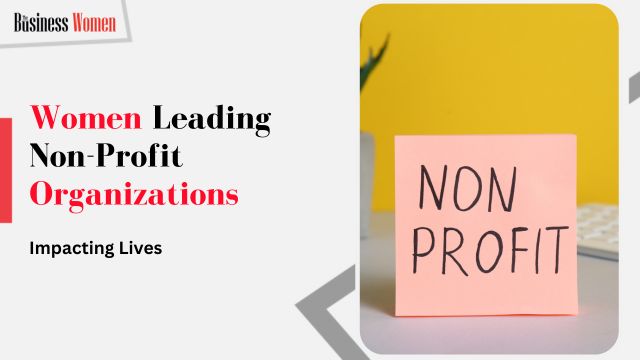Amplify Your Leadership Voice Worldwide
Join 7,000+ industry leaders sharing insights with millions of professionals globally
Join 7,000+ industry leaders sharing insights with millions of professionals globally

In a world where empowerment and inclusivity have become paramount, women are carving a significant niche for themselves as leaders of non-profit organisations in India. These women are breaking glass ceilings, impacting lives, and catalysing social change. In this article, we will delve into the remarkable journeys of these women leaders who are driving meaningful transformations within the non-profit sector, fostering gender equality, and creating a lasting impact on society.
The non-profit landscape in India is witnessing a remarkable shift as visionary women take up the mantle of leadership. The transition from traditional norms to inclusive leadership styles fosters diversity within organisations. This paradigm shift has led to the emergence of innovative strategies and dynamic solutions, enabling non-profits to address multifaceted challenges effectively. Women leaders bring their unique perspectives and experiences to the table, fostering an environment of collaboration and empathy.
The impact of women-led non-profit organisations is undeniable. These leaders are driving social initiatives that address various issues, from education and healthcare to gender equality and environmental sustainability. By leveraging their expertise and passion, these women craft holistic approaches that create lasting change within communities. These organisations are breaking down barriers and fostering a more equitable society through targeted projects, advocacy campaigns, and grassroots movements.
Non-profit organisations led and run for women are uniquely positioned to address the challenges women and girls face. These leaders understand the nuances of gender inequality and drive initiatives that empower women at every level. From mentoring programs and skill-building workshops to advocating for policy changes, these organisations create an ecosystem where women can thrive personally and professionally.
Below mentioned are some examples of NGOs that are working for the welfare of the women in the society:
CREA’s efforts have enabled women to lead lives without abuse, discrimination, injustice, and stigma. Their support in understanding and advocating for human rights has made a substantial difference. Operating at local, national, and global levels, CREA tirelessly works to advance the rights of diverse groups of women, including single women, heterosexual women, sex workers, lesbians, transgender individuals, disabled women, young women, married women, and HIV-positive women, among others. Since its establishment in 2000, CREA is a feminist human rights organisation that empowers women to learn, question, advocate for, and drive positive social change. Its vision encompasses a future marked by peaceful coexistence, equality, and dignity for all.
Under the banner of MAKAAM, an informal national platform, dedicated efforts are channelled to safeguard the identity and rights of women farmers across India. This platform addresses critical concerns related to the treatment of women farmers within families affected by farm suicides. It sheds light on the array of challenges faced by women farmers. MAKAAM equips women to navigate their lives, pursue careers, and fulfil family responsibilities through self-reliance by extending support and empowerment to farm suicide-affected families.
Established in 1980, Shikshan Ane Samaj Kalyan Kendra (SSKK) is committed to providing women and children with sustainable livelihood opportunities. The organisation is dedicated to tackling domestic abuse and violence against women. SSKK aids in the formation of self-help groups and the establishment of stable income sources for women. Through its efforts, SSKK has played a pivotal role in empowering women, reshaping their status, and aiding them in attaining independence, self-sufficiency, and self-respect.
Sakhya ensures that everyone, regardless of gender or cultural background, possesses a voice within their home and community. The organisation actively works to challenge preconceived notions that perpetuate gender discrimination through a diverse range of interventions. Sakhya takes pride in its micro-level engagements with survivors of domestic and household abuse, complemented by its macro-level involvement in social work and women’s empowerment initiatives.
Ela Bhatt established the Self-Employed Women’s Association (SEWA) in Gujarat in 1972. SEWA’s Trade Facilitation Centre stands as a testament to the empowerment of women artisans. Owned and operated by 50,000 women artisans, it ranks as India’s largest women’s organisation, having established an intricate supply chain of skilled artisans. SEWA’s mission equips women with essential knowledge and skills to excel across various informal sectors. With a membership of 1.9 million spanning globally, including places like Sri Lanka and Afghanistan, SEWA’s impact is far-reaching and transformative.
The impact of women leading non-profit organisations extends beyond immediate outcomes. These leaders are working tirelessly to create a lasting legacy of change. By nurturing a new generation of leaders, establishing robust frameworks, and setting high standards for transparency and accountability, these women ensure that their initiatives continue to thrive and evolve in the years to come.
In conclusion, the role of women leading non-profit organisations in India cannot be understated. Through their vision, determination, and innovative strategies, these leaders are significantly impacting society. As we celebrate their achievements, we also recognise the importance of continued support and collaboration to ensure that their efforts lead to a brighter and more equitable future for all.
Join industry leaders who have shared their insights with millions of professionals globally.